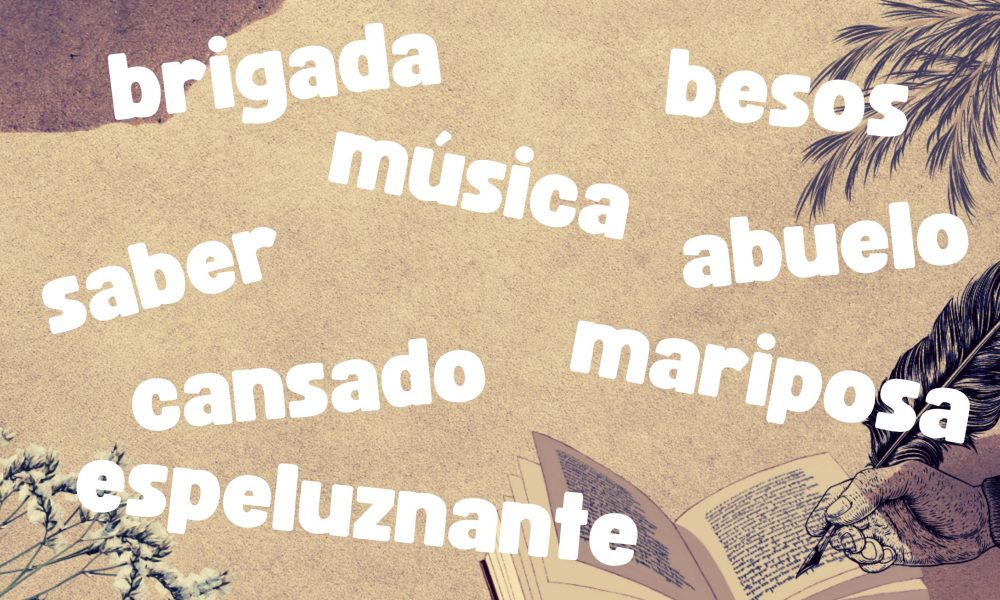
Palabras en español [3]
We could not let the semester end without another edition of Palabras en español! This time, our students from SPAN 102 A&B (Beginning Spanish II, Fall 2023) share their favorite words below. Such great choices!
 Abuelo
Abuelo
by Cathy Blankenship
The Latin word for grandfather is Abuelo. Something I struggle with saying this word is that fluent speakers usually do not over pronounce the way I am used to. Having the ability to say I grew up with my grandpa is a blessing. We have always been so close throughout my life, and I owe so much of my personality to him. Throughout my childhood I was disconnected from my Hispanic roots from my mother’s side. Her dad’s parents, my grandpa’s, was originally from Mexico, then from Texas. His family eventually moved them all up to Indiana. I’ve always appreciated the traditions my grandpa and mother introduced to me from their Hispanic side. My favorite was to get barbacoa and pork tamales and have breakfast with my family on Sunday mornings. Another was when my mother, grandpa, and I would make tamales around the holiday season. We would listen to the classics they grew up with and spend hours together. We would share laughs and even tears. These traditions impacted me so much and are the main reason why I am such a family oriented person. My grandpa showed me how important family is and how to always show appreciation and love. This year is the first year I will not have my grandpa for the holiday season. The first time we will have to continue these traditions without the man who introduced them to us. As excited as I am for my favorite time of the year, I wish we could all do it together again. I have so much to thank my grandpa for, and we will continue to stay together as a family for him. Thank you Abuelo, I love you.
 Besos
Besos
by Xaria Biggerstaff
A word in Spanish that has special meaning to me is “Besos”. The correct way to pronounce it is BAY-SOS. Besos in english means kisses but in the Spanish dictionary it states that it is also a form of greeting. In Spain, people are used to kissing others as a sign of affection. When two people meet, they give each other two kisses, on both cheeks. The two kisses represent a way to say hello and goodbye. The connotation around it is used mostly to say goodbye, in a letter, or message when it is written. The background behind Besos comes from old Spanish, from Vulgar Latin. It has been the formal way of how others introduce each other. My boyfriend uses this word whenever he refers to my dog. My boyfriend and I treat my dog like he is our kid and we love giving him all the affection we can. We often use the word Besos as a way to imply that we are going to give the doggy some kisses. For example, we might say, “Give him some Besos”. We love using this word because it is also just fun to say.
 Brigada
Brigada
by David Ramay
Brigada es un sustantivo femenino: “Un grupo del ejército formado por dos regimientos.” La etimología, de la palabra latina “briga”, quiere decir “lucha”. “Brigada” es en el título de una canción de la guerra civil de España, “Viva la Quince Brigada” que es sobre la brigada de voluntarios de otros países que lucharon contra fascistas y falangistas de Franco. La brigada también fue llamada “the Abraham Lincoln Brigade”, y tenía muchos Estadounidenses e Ingleses. La canción es una de lucha y dificultad, y creo que el origen de la palabra “brigada” es importante para aprender qué es una brigada, y qué es un ejército que luchó contra fascistas, especialmente una brigada que es muy importante en la historia del mundo.
 Cansado
Cansado
by Abbie Klaiber
The definition of cansado in English is tired or beat, according to Spanish dictionary.com. The word comes from the Latin word cansātus, which has a very similar meaning. It has two masculine forms, cansado and cansados, and two feminine forms, cansada and cansadas. The word is pronounced as kahn – sah – doh. This was one of the first words my second high school Spanish teacher taught us. She came in on the first day of the trimester and said, “Clase, ya estoy cansada.” Profe decided that instead of going over the vocabulary of every item of furniture you could think of, like was planned, she was going to start the semester off with us learning any and all daily words or phrases we might use in class. That way when we would ask a question or get in our small groups we could successfully start to use Spanish. Instead of learning a bunch of vocabulary words we weren’t going to use, she had us make lists of everyday phrases and words we use all the time. My life is also very hectic and I don’t get much sleep on weekdays, so saying I am tired is a very useful phrase. The tactic she used made learning Spanish much more personal and engaging for me. That became the turning point from being required to take a Spanish class, to enjoy learning a new language.
 Espeluznante
Espeluznante
by Elizabeth Lieb
“Espeluznante” means hair-raising or terrifying and can also be translated to eerie or spooky. It originates from the Spanish verb “espeluznar,” which contains a root pelu- meaning hair. Unfortunately, its ancestral etymology remains unclear. In Spain, it is pronounced ehs-peh-loos-nahn-teh. Whereas it is pronounced ehs-peh-looth-nahn-teh in Latin America. To me, it either sounds smooth and enticing or like someone is sneezing. These are two very different things, but perhaps that is the beauty of “espeluznante.” Entering October, the spooky season is just beginning. Personally, I don’t invest too much into Halloween, nor have I really experienced El Día de los Muertos. I don’t really enjoy scary movies or being terrified either. My Halloween celebrations tend to be a little more lighthearted. For example, one year I dressed up as a basic, two story house like the ones young children draw. Compared to descriptors such as “terrifying” or “hair-raising,” spooky is the rated G version. As such, the word “spooky” accurately embodies my opinions and feelings towards Halloween. In English, spooky isn’t very common, but I still think it’s fun and enjoy the way it sounds. To my delight, I recently discovered that its Spanish translation is just as enticing. Perhaps, I dare say, even spookier. ¡Feliz temporada espeluznante!
 Mariposa
Mariposa
by Rhonda Collier
The Spanish word that I find beautiful and significant is Mariposa. Mariposa in English means butterfly. This word, for me, captures the beauty and change of this insect along with life. Mariposa is believed to have originated from the Spanish phrase, ‘Maria posate,’ which translates to ‘Mary, alight!’ The name Mariposa is widely known and it even belongs to the Lily family. The Mariposa Lily has long, thin, parallel-veined leaves and is native to western North America. This has also been used by many California tribes as food and to treat injuries. Mariposa is a word that I feel explores beauty and change in our lives. When we think of a butterfly coming out of a cocoon, we think about how we have grown and changed through each stage of our life. Even in death, a butterfly is significant. In death we shed our skin and enter a new world of beauty and change with God. I love to associate butterflies with the death of loved ones. It’s comforting to know they are soaring free and will be with God in a new body that has found its beauty again. I feel this is a symbol of transformation, hope, and faith and after death it is a rebirth. The colors of Mariposas are the most beautiful part of them. There are so many beautiful colors and their wings appear glittery due to thousands of microscopic scales. There are so many different species and bright beautiful colors. Every color imaginable belongs to a Mariposa, and I find myself lucky to be able to see them fluttering around all summer.
 Música
Música
by Carolyn Fifield
Música, Similar in English as music, is defined as “vocal or instrumental sounds (or both) combined in such a way as to produce beauty of form, harmony, and expression of emotion”. The Latin word itself derives from the Ancient Greek mousiké (technē)—μουσική (τέχνη)—literally meaning “(art) of the Muses”. I chose this word because Latin music played a huge role in my journey to learning Spanish as my second language, and now my college education minor. As the definition states, music is a beautiful way to express emotion, and bring people together. Through my time as a student in Spanish, I have been able to learn about the beauty and history of Hispanic culture, and broaden my knowledge of speaking Spanish through music. The artist with the most impact on me and my discovery into Spanish/Latin music was Rosalía. Rosalía is a Spanish Flamenco singer, songwriter, and producer, whose music is more of an art than anything else. She is one of the most influential and successful Spanish singers of all time, and her music has transported millions of people in her world of imagery and emotion through her art, including me. Though I found her music as only a beginner Spanish speaker, listening to her more and more has influenced me to dive deeper into the culture and history of Spanish/Latin music. She has created a want to better myself in learning Spanish, so I can fully immerse myself in hers, as well as many other Spanish/Latin artists’ music.
 Saber
Saber
by Alex Pawlowski
Saber, translated literally in English as “to know”, is a Spanish word that particularly fascinates me. Aesthetically, it is a wonderful word to pronounce, as the ‘s’ and soft ‘b’ sounds flow well with the broad vowels to create an enchanting combination. Researching its origins, I discovered that the word descends from the Latin word “sapere”, which translates literally to “to taste”. Although initially confused about the relation, further research unearthed that “sapere” had a more complex meaning than I had initially assumed, as it could also be translated to mean “to discern” and gained an association with the concept of wisdom, leading to it also becoming the root word of the English “sage”. This distinction, although subtle, compels me. I am a person with a deep interest in expanding my knowledge, and the deeper level of understanding and recognition implied by “saber” encompasses my mindset far better than the simple acknowledgement found in “to know”. Furthermore, this distinction illustrates well the myriad of differences in the range of expression that Spanish allows for, demonstrating one of the reasons behind my desire to learn Spanish. As a bonus, it is also one of the verbs that I use more than any other, as I am often forced to admit that “no sé” as I learn Spanish.
![Palabras en español [3]](https://blogs.valpo.edu/hispavalpo/files/2024/09/HVBanner-e1726609772331.png)